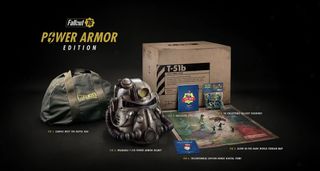THE LOWS

Chris Livingston: Baggage
The hits keep on coming for Fallout 76. Customers who preordered the Power Armor Edition found the attractive canvas bag advertised as part of the edition was in reality a nylon one, resulting in even more unhappiness about the game. Bethesda offered 500 Atoms as compensation, which is about $5 worth of microtransaction currency and not enough to really buy much of anything in the in-game store.
Look, Bethesda, this is some really shitty customer service. The people who preorder $200 editions of a game they haven't played represent your mega-fans, and as such they really doesn't require much effort on your part to make them happy. They're already happy! They threw $200 at you months before your game came out! They love you! Or at least, they did.
If there's a problem during the production of a special edition, let the people who paid for it know immediately. A simple email sent ahead of time, apologizing and saying one of the items in the edition wouldn't be as promised, probably would have been enough. Disappointing, sure, but forgivable. No one bought the edition specifically for the bag, they bought it for the game and helmet. If you really want to make good on the promise (it doesn't sound like you do), manufacture and ship the proper bag later, or issue a refund for whatever the bag is worth ($10?). Giving no warning, no explanation, and 500 Atoms isn't the way to hang onto the biggest fans you've got. That's not the least amount of effort, that's no effort at all.
Tyler Wilde: Loot rules
I don't like loot boxes and have frequently criticized them, but I also don't like that the US Federal Trade Commission is investigating the practice.
The industry's self-regulation wing, the ESRB, is increasingly meaningless. Many of the games you buy on PC are not rated, because being rated is not a requirement for being sold on digital distributors like Steam and GOG. I'm fine with that, so long as we (the public and press) continue holding publishers accountable. It would not be practical for the ESRB to rate every indie game released for download, and it would create a prohibitive barrier for small developers. Also, the ESRB advocates for the industry, so of course it isn't against one of the industry's biggest money makers. We can't rely on it.
The biggest gaming news, reviews and hardware deals
Keep up to date with the most important stories and the best deals, as picked by the PC Gamer team.
But is turning to the government a good idea? In my view, it's never a good idea. The best-case scenario for the anti-loot box crowd, if the government gets involved, is that it gently decides that loot boxes aren't cool and makes everyone stop without any other knock on effects whatsoever. That seems unlikely. One of the worst-case scenarios is that the US government overrides the ESRB and creates its own mandatory ratings board for games. Maybe loot boxes, which for most of us are just an annoyance, are banned in the process, but there would be a few other consequences, to understate it. I don't think we'd be very happy about it, which is why I continue to encourage direct criticism of monetization we don't like over reporting publishers to the feds.

Tom Senior: Tough dealer
I’m enjoying Artifact a lot. I put many hours into it yesterday and feel like I’ve already gotten my 16 quid worth of entertainment, and that’s before I’ve started seriously deckbuilding and thinking about ‘expert’ play. Sadly it’s suffering from a painful clash of expectations around its business model. Valve has more or less transposed the physical CCG pricing structure into a digital environment where the rules of engagement are quite different.
CCG players have more of a hobbyist outlook and expect to sink a lot of money into a game over time. But players are coming at Artifact from different places. Dota 2 fans have enjoyed a free-to-play game that tends to just charge for cosmetics and optional battle passes. Players coming from Hearthstone are used to the idea that you can dabble with a digital card game for free before investing seriously. And how are entirely new players supposed to know what to expect? A physical CCG might call itself something like the Artifact Starter Set, which creates an expectation for further purchases. If you buy the game fresh and find that the most competitive modes are locked off behind ticket purchases and there’s no other way to get cards? Well you might expect it from a free to play game, but not something you’ve just bought on Steam.
Valve deserves to make money from this cool game, and I think the game’s creators deserve a cut of the secondary card market, but it’s no surprise that it seems like a rough bet to so many players.
Pip: Black Market
On Black Friday/Saver Saturday/Oh My Gosh Please Buy This Sunday/Cyber Monday the commercial world opens its ravenous maw and begins to inhale, like a Kirby from a hell dimension. There are some good deals to be had, and websites/experts/knowledgeable friends can help with sorting the wheaty goodness from the idiotic chaff. But the invitation to spend is becoming ever more aggressive and pervasive—panicked, even.
When I was younger I remember seeing footage of people getting trampled in US Black Friday sales on the news and being glad it wasn’t a thing over here. The closest we seemed to have was my friend and her mum lining up with thermos flasks at 4 am outside the clothing retailer Next on Boxing Day to pick up cheaper trousers. But now Black Friday feels like it’s everywhere, trying to convince me to spend, trying to assert that my life is somehow not enough without this thing or that thing. My strategy is to have a list of things I genuinely need to replace or want to buy anyway and if those are heavily discounted I’ll pick them up. Everything else is just tricking me into thinking I’m saving money when really I’m just spending.

Fraser Brown: Stargazing
I always thought I’d have more time to revisit Wildstar. Carbine’s MMO was even more colourful and charismatic than World of Warcraft and blessed with a much more engaging, kinetic combat system. It had so much character and confident style that I thought it would manage to hold on as other MMOs fell by the wayside, but even going free-to-play didn’t put the end off for very long. It got four years, and then it finally closed its doors on Wednesday. Players captured the last moments for posterity. I’m going to miss my gunslinging rat-thing.
James Davenport: Fate
Destiny 2 and I aren’t doing well. The Season of the Forge just started, and the Black Armory updates start next week, and I don’t really care. I suppose I’m in the minority when I say I’ll miss the typical Destiny expansion package: a couple story missions, a new location, new weapons, and so on. With the new update format, hobbyist players are receiving the greatest benefit, and I’m all for those additions. I just can’t help but wish a slate of new missions in a cool new setting were part of that. I come to Destiny as a Halo fan: in it for the dumb sci-fi and floaty shooting. Grinding activities for better gear doesn’t do much for me, especially with so many living games already taking up my time. I’ll be playing a bit this next season, and I’ll have fun, I just wish more games gave me a nice stopping point. There’s no satisfying everyone though. And hey—Don't’ tell Tim about this, OK?
The collective PC Gamer editorial team worked together to write this article. PC Gamer is the global authority on PC games—starting in 1993 with the magazine, and then in 2010 with this website you're currently reading. We have writers across the US, UK and Australia, who you can read about here.
Most Popular

